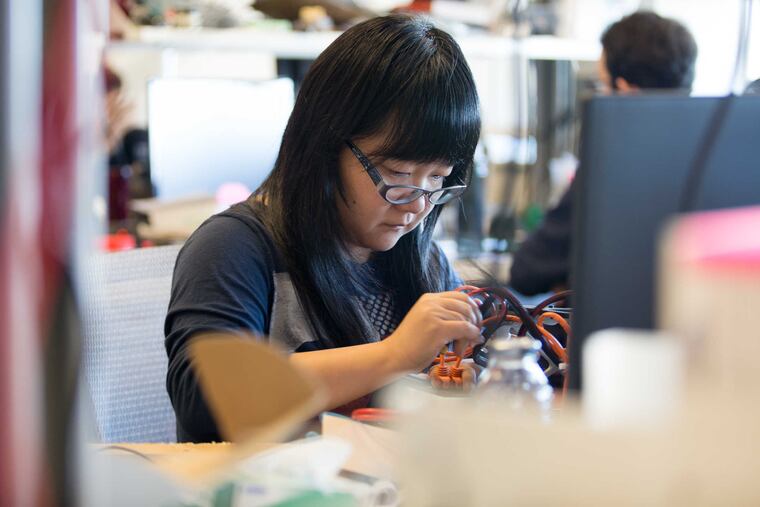Philly is robotics hub of the East Coast
It is difficult to imagine a future where drones and other kinds of robots will not be an important component of our lives. And Philadelphia is playing an important role in inventing that future.

is the Nemirovsky Family Dean at the University of Pennsylvania's School of Engineering and Applied Science
With Philly Tech Week behind us, it is timely to consider some of the latest innovations in technology that are happening here in Philadelphia. We are already known for technology innovation. The Huffington Post ranks us among the top five in tech cities, and the Progressive Policy Institute puts us in the top 10 "Emerging Start-Up Hubs" in the United States.
If you're wondering how Philadelphia has gained this reputation, let me let you in on a secret. Drones have landed on the Schuylkill Banks, and Philadelphia is emerging as the new robotics hub of the East Coast.
At the School of Engineering and Applied Science at the University of Pennsylvania, we have been creating robots that are safer and smarter, robots that can fly, walk, run, and drive, for 30 years. We have created modular robots that can self-configure to walk, swim, or crawl and legged robots that can run, jump, and leap.
The first autonomous flying robot and robot swarms were also created here. And as the ideas behind these technologies have been matured across the globe, from Silicon Valley in California to Shenzhen in China, they are coming home to roost here in Philadelphia.
PricewaterhouseCooper estimates the global market for drones will boom to $127 billion by 2020, and with several flying robot companies popping up over the last few years, our city is uniquely positioned to take a leading role in this field.
One major attractor is Pennovation Works, Penn's new intellectual hub, located in Grays Ferry, which brings together academic and industry partners to collaborate on research, development, and commercialization. The Pennovation Center, a brand-new facility at the heart of the Works, opened last fall, and PERCH, the Penn Engineering Research and Collaboration Hub, sits on its third floor.
At PERCH we have created a unique facility where our students and faculty can brainstorm, design, and create innovative concepts in collaboration with industry partners and spin off start-ups. And it is already changing the innovation landscape in Philadelphia.
Major international players in the drone scene have set up shop there. Qualcomm has established Qualcomm Research Philadelphia after acquiring a flying-robot spin-off from my lab, KMel Robotics. DJI, the top drone manufacturer in the world, has an office in the Pennovation Center.
New drone companies are taking off there as well. Jetoptera is working on a new kind of jet-style engine that future drones might use instead of propellers. Exyn Technologies is working on the AI required for drones to navigate complex environments and work in teams.
These innovations are part of our robotics ecosystem. Penn Engineering spin-offs COSY, which uses computer vision for semantic mapping and helping stores manage their inventory, and Ghost Robotics, which makes fast, lightweight legged robots for uneven terrain, are also calling the Pennovation Center home. IQnetics, which makes more efficient, quiet, and precise motor drivers, and BioBots, which makes a 3D printing system for living cells, are some of our most recent additions.
This is the beginning of a feedback loop that enables exponential growth in a technology-based ecosystem. Indeed, the Milken Institute recently ranked Penn sixth in the nation in terms of technology transfer.
No one can predict the future, but it is difficult to imagine a future where drones and other kinds of robots will not be an important component of our lives. They will help first responders assess risks, survey damage, and look for victims after natural disasters. They will swarm out over fruit orchards, counting oranges and assessing the health of trees. They might even, one day, deliver your newspaper. As someone who has lived in this area for nearly 30 years, and as the dean of Penn Engineering, I am simply delighted that Philadelphia is playing a role in inventing the future.
We're just getting started, and have plenty of room to grow. As we solve the technological and social challenges necessary for drones to become an everyday facet of our lives, I want Philadelphia to be there on the ground floor. Drones can be a part of our civic identity as much as Rocky or cheesesteaks, while serving as the basis of 21st-century jobs and companies.